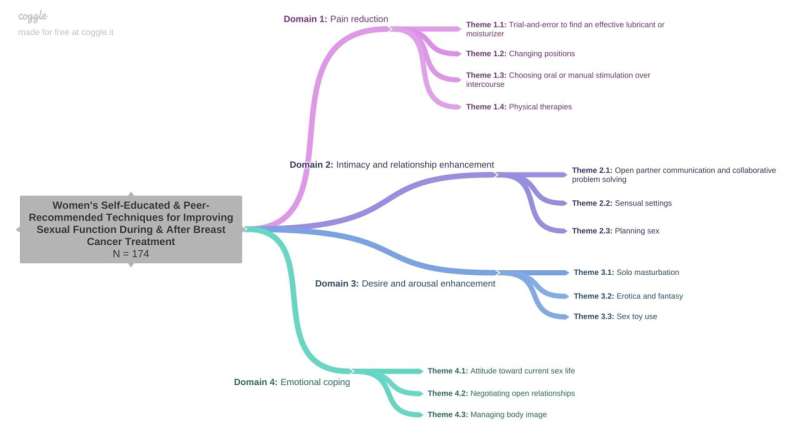This article has been reviewed according to Science X's editorial process and policies. Editors have highlighted the following attributes while ensuring the content's credibility:
fact-checked
trusted source
proofread
Women with breast cancer take sexual health into their own hands: Study

A third of users on a popular breast cancer support forum describe using peer-recommended or self-discovered techniques to improve sexual functioning, according to a study published November 15, 2023 in the open-access journal PLOS ONE by Christiana von Hippel from the Dana-Farber Cancer Institute and Harvard T.H. Chan School of Public Health, U.S., and colleagues.
Over 75% of breast cancer survivors describe experiencing some degree of sexual dysfunction. Commonly prescribed interventions such as vaginal lubricants or numbing creams are only moderately effective, and many women report difficulty in discussing sexual dysfunction with their health care provider.
von Hippel and colleagues reached out to members of the popular Breastcancer.org online forum community who were women over 18 years old and diagnosed with Stage I-IV breast cancer. The study survey sought to quantify the frequency of sexual dysfunction in participants and investigate their techniques for improving sexual function.
A total of 501 women with a median age of 53 years completed the authors' online survey. Participants were 70% sexually active at the time of survey completion, 69% heterosexual, 65% partnered, and 71% white (though about a quarter of participants provided no information regarding partner status, sexual orientation, or race/ethnicity).
47% reported being very or extremely satisfied with their sex lives prior to cancer treatment, and 44% reported having a significantly worsened sex life post-diagnosis. Though a quarter of participants reported discussing sexual function concerns with their providers, with vaginal dryness and pain with penetration the most common issues, the majority (57%) reported never discussing sexual side effects of breast cancer treatment with their clinicians. 35% of participants reported using techniques recommended by a peer or that they discovered themselves in order to improve sexual functioning.
The authors found these techniques tended to fall into four main domains: pain reduction (e.g., using coconut oil for lubricant or choosing new positions); intimacy and relationship enhancement (e.g., more open communication with partners); desire and arousal enhancement (e.g., solo masturbation or using erotica before partnered sex); and emotional coping (e.g., mindset shifts). 46% of participants rated their techniques as moderately or more effective when used in addition to or instead of standard techniques offered by clinicians.
Though the authors note their study may not be widely generalizable because of a lack of diversity in their sample, they encourage providers to initiate conversations around sex with their breast cancer patients and share coping techniques discussed by the participants here.
The authors add, "Women with breast cancer are taking the initiative to fill the gap in their care for sexual symptoms by seeking, innovating, and sharing solutions among themselves."
More information: Taking their wellbeing into their own hands: Self-educated and peer-recommended techniques used by women with breast cancer to improve sexual functioning during treatment and in survivorship, PLoS ONE (2023). DOI: 10.1371/journal.pone.0293298. journals.plos.org/plosone/arti … journal.pone.0293298


















